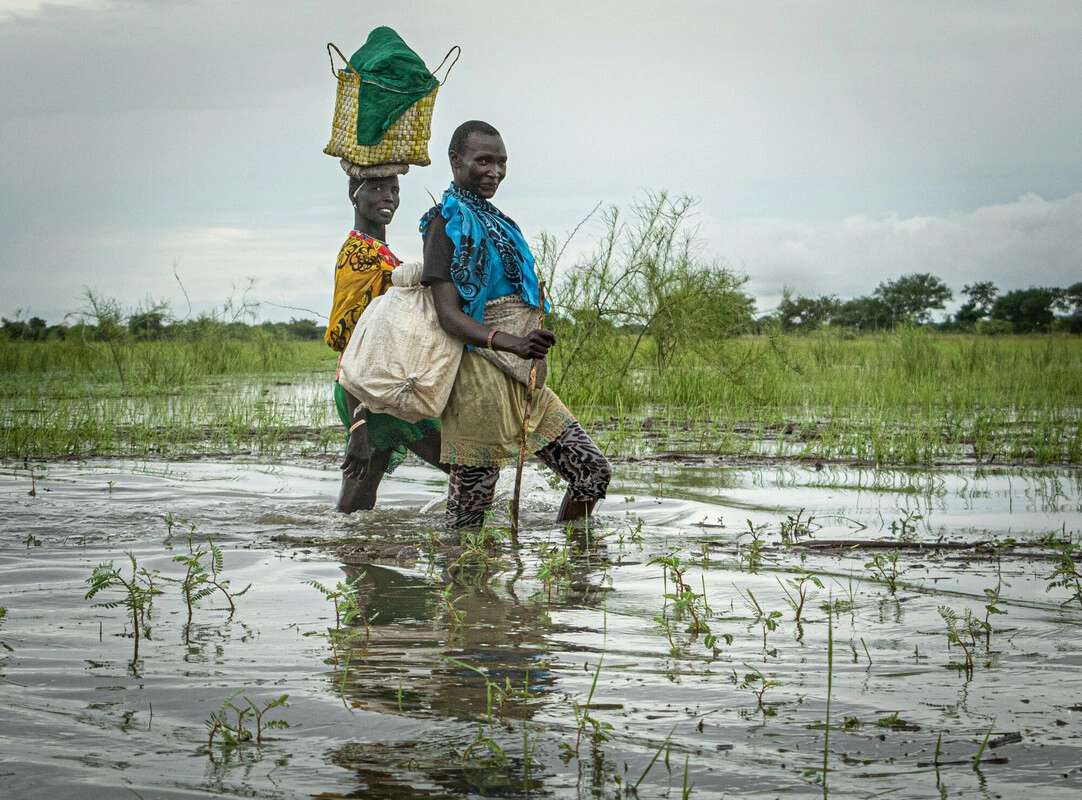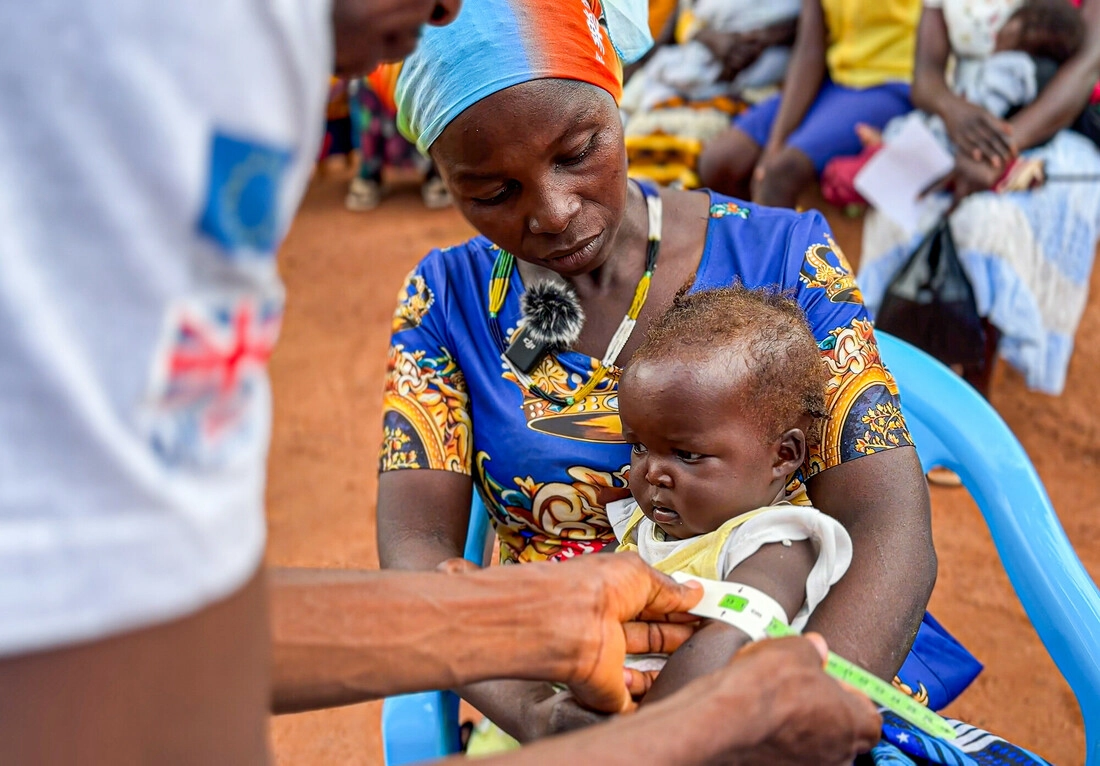Understanding the hunger crisis in South Sudan
.webp)
South Sudan is facing one of the most severe hunger crises in the world. An estimated 2.1 million children are suffering from acute malnutrition. In a country already torn apart by conflict and natural disasters, food scarcity is pushing families to the brink.
But there is hope. Medair’s work in South Sudan is providing life-saving nutrition services to the most vulnerable, and with your help, we can save even more lives.
How do we measure hunger? The IPC phases explained
The severity of hunger in a country is measured using the Integrated Food Security Phase Classification (IPC), which categorises food insecurity into five distinct phases:
- Phase 1: Minimal – households can meet basic food needs without the need for support.
- Phase 2: Stressed – families are struggling to meet their needs, and may need help to avoid falling deeper into crisis.
- Phase 3: Crisis – people face significant food shortages, malnutrition is prevalent, and immediate action is required to save lives and livelihoods.
- Phase 4: Emergency – households are experiencing large-scale food gaps, leading to severe malnutrition, and widespread death is likely without urgent aid.
- Phase 5: Catastrophe – famine conditions are present, with extreme hunger and death occurring on a large scale.
South Sudan is currently facing widespread Phase 3 (Crisis) and Phase 4 (Emergency) levels of food insecurity, with some areas at risk of slipping into Phase 5 (Catastrophe) if immediate action is not taken.
What is driving hunger in South Sudan?
Hunger in South Sudan is driven by a perfect storm of conflict, natural disasters, and economic instability. Since gaining its independence in 2011, the country has been locked in cycles of violence that have displaced millions of people and disrupted agriculture and trade.
Flooding in 2024 has only worsened the situation. According to the World Food Programme (WFP), severe flooding has submerged swaths of farmland under water, further limiting food supplies. As a result, food prices have soared, leaving millions of families unable to afford basic nutrition.

The Integrated Food Security Phase Classification (IPC) estimates that from December 2024 to March 2025, 6.3 million people are facing high levels of food insecurity. Of these, 1.71 million people are at “crisis” levels of hunger – or worse – meaning their lives are at immediate risk without urgent assistance.
For children, the situation is even more critical. UNICEF reports that 1.6 million children are suffering from acute malnutrition, and without treatment, many will not survive.
The toll of hunger on families
For families in South Sudan, hunger is not just about the lack of food – it’s about the loss of hope. Mothers are forced to make heartbreaking choices, like whether to buy medicine or food for their children. In some communities, parents feed their children wild plants just to keep them alive.
These stories are not uncommon. Every day, Medair’s teams meet families like these; families who have lost everything to hunger. But with your support, we can change their stories from despair to hope.
Medair’s response: life-saving nutrition services for the most vulnerable
In the face of South Sudan's escalating hunger crisis, Medair is providing a comprehensive range of nutrition services that directly target the root causes and effects of malnutrition. Our teams work in some of the most remote and hard-to-reach areas, delivering life-saving care where it is needed most.
1. Stabilisation Centre
Medair’s Stabilisation Centres provide 24-hour care to children suffering from severe acute malnutrition (SAM) with additional life-threatening complications. These centres are equipped with trained medical staff who deliver emergency interventions, including:
- Therapeutic feeding: severely malnourished children are given therapeutic milk that quickly restores their strength.
- Medical treatment: children with severe acute malnutrition often suffer from secondary infections like pneumonia, malaria, or diarrhoea. Medair’s Stabilisation Centres provide antibiotics, antimalarials, and rehydration therapies to treat these conditions alongside malnutrition.

This level of intensive care can turn a child's health crisis around within days, saving their life. Every $50 donation helps treat a child and gives them a chance to survive and thrive. Children who leave the centres are not only healthy again, but also significantly less vulnerable to future health complications.
2. Outpatient Therapeutic Programmes (OTP)
For children who are malnourished but do not require hospitalisation, Medair operates Outpatient Therapeutic Programmes (OTP). These programs provide:
- Weekly check-ups: health workers monitor children’s weight, height, and nutritional status to track their progress and ensure that treatment is working.
- Home-based therapeutic feeding: families are given weekly rations of ready-to-use therapeutic food, which mothers administer at home, allowing children to recover without being admitted to a clinic.

By treating malnutrition in a home-based setting, OTPs allow families to remain together, reduce the strain on health facilities, and empower mothers to take an active role in their children's recovery. Children in OTPs typically show marked improvement in 4-6 weeks, reducing the risk of long-term developmental delays or even death.
3. Targeted Supplementary Feeding Programmes (TSFP)
Medair’s Targeted Supplementary Feeding Programmes (TSFP) provide essential nutrition to children, pregnant women, and lactating mothers who are at risk of falling into severe malnutrition. These programmes offer:
- Fortified food rations: families receive fortified blends of cereals and pulses that provide vital nutrients such as vitamins and minerals, specifically designed to support recovery in children and mothers.
- Prevention of malnutrition relapse: TSFPs help those who have recovered from severe malnutrition avoid relapse, which is crucial for long-term health and well-being.
By targeting both children and mothers, TSFPs break the cycle of malnutrition in families. Proper nutrition for pregnant women also ensures healthier pregnancies and better outcomes for newborns, reducing infant mortality rates and giving children a stronger start in life.
4. Community-based malnutrition screening and education
Medair's work goes beyond treatment – it also focuses on early detection and prevention. Our teams partner with local communities to provide:
- Malnutrition screenings: community health workers are trained to conduct MUAC (Mid-Upper Arm Circumference) screenings, which help identify malnourished children early. These children are then referred to the appropriate nutrition programme before their condition worsens.
- Health and nutrition education: families receive practical guidance on proper child feeding practices, hygiene, and how to spot early signs of malnutrition.

Early detection is key to preventing severe malnutrition. Through regular screenings and community involvement, Medair can reach at-risk children faster, reducing the need for emergency interventions. The education provided empowers families to maintain healthy practices long after they’ve received treatment, building more resilient communities.
The direct impact of Medair’s services on hunger
Through these combined efforts, Medair’s nutrition programmes are having a tangible, life-saving impact on the fight against hunger in South Sudan. By treating malnutrition early and comprehensively, we not only save lives but also help children and families build healthier, more sustainable futures.
- Reduction in child mortality: with access to therapeutic feeding and medical care, children who were once on the brink of death can recover and lead healthy lives.
- Stronger communities: by providing ongoing nutrition support to mothers and children, Medair helps strengthen entire communities, making them more resilient to future crises.
- Long-term impact: a well-nourished child is more likely to grow up healthy, attend school, and contribute positively to their community. Medair’s programmes create a ripple effect that lasts long after immediate hunger is alleviated.
Help us fight hunger in South Sudan
The hunger crisis in South Sudan is one of the most devastating in the world, but we can make a difference – you can make a difference. Every day, Medair is on the frontlines, delivering life-saving care to children and families who would otherwise face unimaginable loss. But we cannot do it without your help.

You have the power to save lives.
- Your gift of $50 can provide therapeutic milk to save a severely malnourished child’s life in our Stabilisation Centres.
- $100 is enough to fully cure an acutely malnourished child in our outpatient nutrition programme.
- $200 can fund a pulse oximeter that monitors the oxygen level of severely malnourished children during treatment in our Stabilisation Centres.
These are not just numbers – they represent real lives, real children, and real futures. Your donation today will give hope to families on the brink of survival and help us continue our urgent work in South Sudan.
Please don’t look away. Donate now and give the gift of life. Together, we can turn hunger into hope.
This content was produced with resources gathered by Medair field and headquarters staff. The views expressed herein are those solely of Medair and should not be taken, in any way, to reflect the official opinion of any other organization.
.webp)
.webp)
%20(1).webp)